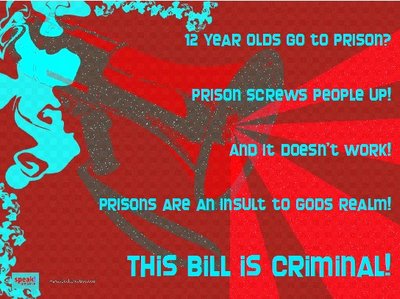There is, sitting at parliament, a Members Bill that seeks to reduce criminal responsibility from age 14 to 12. Yes, 12. It also wants to widen the scope for more young offenders to go to prison and make punishment harsher etc. You can read it here.
Christians, awake! This is a hideous Bill, which has already gone through to select committee- National, First and Labour are supporting it.
“Never in any part of the Bible are prisons part of Gods way. Always they are used to oppress. Always they are an affront to the divine. There are no good prisons. None” (Olson, God who dared)
 Kiwi’s, make a submission- guidelines on how to do that are here. For inspiration, read the Social Policy Units Prison Report, Beyond the Holding Tank. Or have a look at my initial thoughts below. Sorry to pop such a big fat post up, but it may be helpful to a few.
Kiwi’s, make a submission- guidelines on how to do that are here. For inspiration, read the Social Policy Units Prison Report, Beyond the Holding Tank. Or have a look at my initial thoughts below. Sorry to pop such a big fat post up, but it may be helpful to a few.
“While men go to prison in and out, in and out, I’ll fight” (Booth)
Jesus lovers in NZ :I urge you to consider writing a submission.
- Youth crime is portrayed as increasingly prevalent and acute. The public is terrorised by headlines of young violent law-breakers despite 2005 assertions by NZ police that most youth offences are not serious, and very few become persistent and serious offenders (http://www.police.govt.nz/resources/2005/youth-policing-plan/youth-policing-plan.html.) There is an obvious lack of communication of this information to the public. A Bill with such dramatic implications needs to be based on relevant and accurate statistics, not distorted media reports and irrational public fear.
- This Bill will result in more young people being imprisoned which exacerbates rather then deals with the underlying causes of offending. The young people this bill impacts- the persistent or serious offenders- are the ones who are in greatest need of holistic help. Last year NZ police recognised that the majority of persistent youth offenders come from backgrounds of disadvantage and have been victims of abuse and unstable family environment. Giving harsher punishment rather than dealing with the root issues such as abuse, family stability, truancy and deprivation will result in a high probability of recidivism.
- Increased imprisonment of young people needs to be avoided as it takes away hope for their future. Research has shown that those who have been imprisoned face poor living conditions and less access to health care, education, employment, housing and social connectedness than the general population (Beyond the Holding Tank, p47). Young people should not have to face such great barriers to reintegration into society at such an age for an offence committed whilst they were still a child.
- Increased imprisonment of young people is ineffective. Harsher punishment has been found to be the least effective way to change a person’s behaviour by over 23,000 studies (Beyond the Holding Tank, p50). If a reduction in crime is the aim alternative methods other than imprisonment need to be found for all lawbreakers. Yet this is an increased need for young people who are still developing behaviourally and socially.
- The need for alternative methods of justice for young people in order to deal with these root issues and prevent further offending has been recognised by the labour government in its development of a long term strategy put in motion with the Children, Young Persons and their Families Act 1989. Family group conferences, Youth Offending Teams and a variety of other creative initiatives form an integral part of a great investment by the Labour government to tackle youth crime.
- These alternative methods of the youth justice system have been perceived as a soft response, which is perhaps why this Members Bill has been proposed. This is despite the success of Family Group Conferences. Research shows that young people do not find Family Group conferences an easy option, and that overall FGCs hold young people accountable for their offending and prevent re-offending. (Beyond the Holding Tank, p64)
- The restorative methods of the Youth Justice System have not had opportunity to take full effect due to a lack of resources and insufficient time. The full impact of alternative justice is yet to show on youth crime rates, but most project it will be positive (NZ Police). More resources should be invested into the alternative methods of the current youth justice system so that FGC’s can be undertaken more efficiently and young offenders can receive greater assistance to prevent re-offending.
- The government should persist in its restorative approach for young offenders and not relinquish the significant investment already made. This Members Bill wholly contradicts the principles and methods behind the progressive moves undertaken to curb youth offending. To implement this legislation would be a step backward that will result in more damaged lives; for the young offenders and their victims.
Please get in touch 4 more info/links etc.


No comments:
Post a Comment